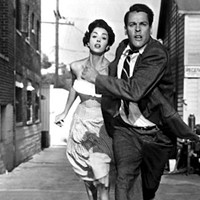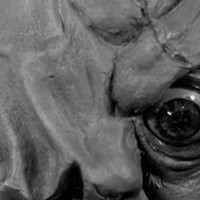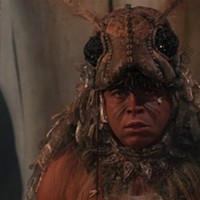(View From The Couch is a weekly column that reviews what's new on Blu-ray and DVD. Ratings are on a four-star scale.)

- Elsie Fisher in Eighth Grade (Photo: Lionsgate & A24)
EIGHTH GRADE (2018). Hereditary was unsettling through its pervasive atmosphere of dread, while First Reformed was unnerving in its implications involving violence and vindication. Yet for a summer ’18 outing that truly got under the skin while simultaneously wreaking havoc on our emotions and expectations, there was Eighth Grade, an impressive indie effort set in that terrifying wasteland known as middle school. Television and YouTube star Bo Burnham makes an impressive feature-film debut as the writer and director of Eighth Grade, yet the real story here is the knockout central performance by 15-year-old Elsie Fisher — she’s cast as Kayla Day, an introverted student struggling to survive her last week of eighth grade before preparing for high school. Kayla has no friends and no self-esteem (despite posting inspirational videos on YouTube that are viewed by absolutely no one) – what she does have is a severe case of acne, a dependency on social media, and a well-meaning single dad (Josh Hamilton) who annoys rather than inspires her. Eighth Grade hits upon the usual points we would expect from a film of this nature — mean girls, dreamy boys, and nerds of all stripes — but the movie is stripped of practically all artifice. Photographed in a manner that offers the actors no opportunities for reprieve or retreat, this is a raw and realistic movie, and viewers will be clenching their teeth each time they anticipate the worst for poor, withdrawn Kayla and breathing a sigh of relief every time something fortuitous breaks her way. The year-end awards-contender season is about to begin, but expect Eighth Grade to remain in the conversation — and rightly so.
Blu-ray extras consist of audio commentary by Burnham and Fisher; a making-of featurette; deleted scenes; and a music video.
Movie: ***1/2
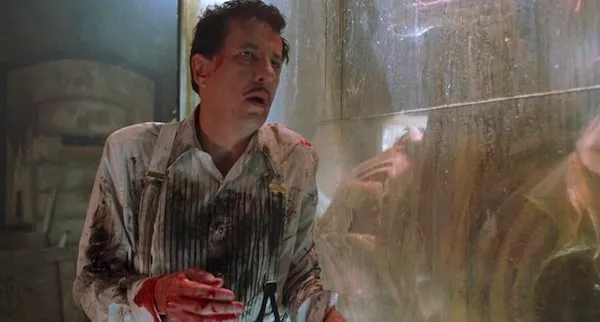
- Geoffrey Rush in House on Haunted Hill (Photo: Shout! Factory)
HOUSE ON HAUNTED HILL (1999). William Castle’s 1958 House on Haunted Hill stars Vincent Price as an eccentric millionaire who offers a group of people $10,000 apiece if they can survive a night in a haunted house. That version still offers reams of campy fun, and, at the time of its original release, Castle (known as much for his showmanship as for his films) even had theaters rigged with a skeleton that would sail over the auditorium at a choice moment in the movie. There was no such luck with this 1999 remake; the most that audience members could reasonably expect to come flying over their heads was a piece of stale popcorn hurled by a bored teenager in the back row. The passage of time hasn’t improved this version one iota, although at least home viewers don’t have to subject themselves to the lobby posters sporting that year’s daftest tagline (“Evil Loves To Party”). Geoffrey Rush stars as Stephen Price (an homage, natch, to Vincent), an obnoxious amusement-park owner who agrees to his toxic wife’s (Famke Janssen) demand to have her birthday party held in an abandoned mansion that once served as the Vannacutt Psychiatric Institute for the Criminally Insane (look for Re-Animator star Jeffrey Combs in flashback scenes as Dr. Vannacutt). Nasty incidents start occurring at the gathering, but are they being instigated by Price, his wife, or the malevolent spirits still prowling the premises? There are absolutely no scares to be found in this overwrought horror flick, and while the nastiness of the characters portrayed by Rush and Janssen provide some edge, the assorted guests (played by Taye Diggs, Ali Larter, Peter Gallagher, Chris Kattan and Bridgette Wilson) prove to be an unspeakably dull assemblage.
Blu-ray extras include an interview with director William Malone; deleted scenes; and a piece on the two different film versions.
Movie: *1/2
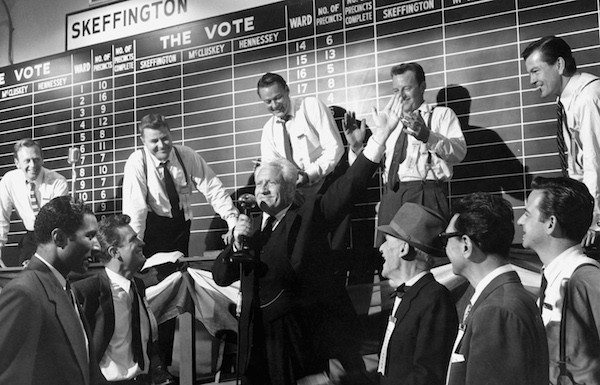
- Spencer Tracy (center) in The Last Hurrah (Photo: Twilight Time)
THE LAST HURRAH (1958). Sporting a title that almost proved to be prophetic for its leading man — Spencer Tracy briefly considered retiring after this movie but instead remained active until his death nine years later — The Last Hurrah is terrific entertainment until it’s stopped dead in its tracks by a painfully protracted finale. Until this lamentable loss of momentum, though, this adaptation of Edwin O’Connor’s novel moves like wildfire, with John Ford overseeing a terrific cast of veterans who have no problem slinging around the exquisite dialogue. Tracy is terrific as Frank Skeffington, an old-school Democratic mayor who’s facing one final reelection campaign. In his corner is his columnist nephew (Jeffrey Hunter) as well as his circle of faithful operatives (Pat O’Brien and James Gleason among them); opposing him is an elitist banker (Basil Rathbone) and a right-wing newspaper publisher (John Carradine) who once belonged to the KKK; somewhere between these two extremities is the local cardinal (Donald Crisp), who opposes Skeffington’s policies but personally admires the man. Inspired comic interludes include a television interview with Skaffington’s opponent (Charles B. Fitzsimons), complete with a perpetually yapping dog, and the sequence in which the banker’s dim-witted son (O.Z. Whitehead, basically foreshadowing George W. Bush) is being groomed for an important post. Luckily, the majority of the movie is strong enough to survive the lengthy concluding stretch that occurs after the election is over.
Blu-ray extras consist of audio commentary by film historians Lem Dobbs, Julie Kirgo and Nick Redman; the theatrical trailer; and an isolated music track.
Movie: ***1/2

- Leonardo DiCaprio in The Man in the Iron Mask (Photo: Shout! Factory & MGM)
THE MAN IN THE IRON MASK (1998). Alexandre Dumas’ classic novel is transformed into a sporadically entertaining motion picture by writer-director Randall Wallace, the Oscar-nominated scripter behind Braveheart. Once again, Wallace tells a story of how lusty men seek to battle the tyranny that disrupts their lives — in this case, it’s the aging musketeers Aramis (Jeremy Irons), Athos (John Malkovich) and Porthos (Gerard Depardieu) who valiantly try to overthrow the cruel King Louis XIV (Leonardo DiCaprio) and replace him with his twin brother (also Leo), a sensitive soul who has been kept locked away for years in the palace dungeons. But the heroes’ best-laid plans encounter some resistance from their old ally D’Artagnan (Gabriel Byrne), who, as captain of the king’s guard, is determined to protect the crown at any cost. It’s an irresistible story, but the movie suffers from clunky dialogue and a barrage of mismatched performances that represent just about every school of acting known to man. Thanks largely to their flat accents, the Yankees (DiCaprio and Malkovich) fare the worst, although Leo gets better as the movie progresses. The best emoting comes courtesy of Byrne, who ably carries the bulk of the narrative shifts. Visually, this well-crafted film is pleasing to the eye — Depardieu’s occasionally bare buttocks notwithstanding.
Blu-ray extras include audio commentary by Wallace; a vintage behind-the-scenes featurette; new interviews with producer Paul Hitchcock and production designer Anthony Pratt; a vintage interview with Wallace; and the theatrical trailer.
Movie: **1/2
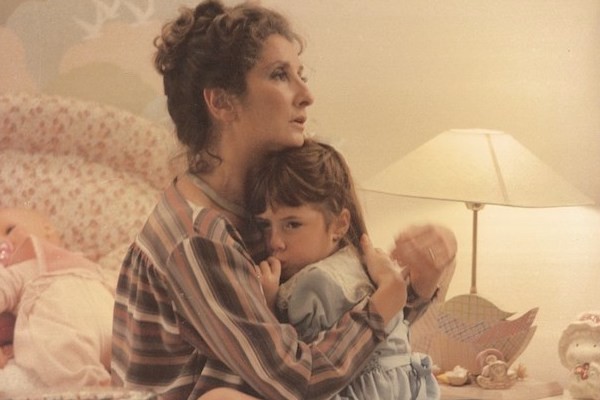
- Norma Aleandro and Analia Castro in The Official Story (Photo: Cohen)
THE OFFICIAL STORY (1985). Set in Buenos Aires in the immediate aftermath of the “Dirty War” that saw the right-wing military dictatorship systematically torture and murder thousands of innocent people, this sobering Argentinian drama follows the odyssey of Alicia (Norma Aleandro), a high school history teacher who transforms from oblivious bystander to informed participant. Married to a powerful government operative, Alicia is content in her role as supportive wife to Roberto (Hector Alterio) and loving mother to adopted daughter Gaby (Analia Castro). It’s only when her best friend Ana (Chunchuna Villafane) returns from exile that her eyes are opened: Not only does Ana relate her own harrowing experiences as a political prisoner, she also shares the fact that many babies were taken away from their imprisoned mothers and sold to wealthy families. Alicia is horrified to think that Gaby might have come into her life via this reprehensible route, and she becomes obsessed with uncovering the truth regarding the adoption. Director Luis Puenzo, who also scripted with Aida Bortnik, has fashioned a movie that simultaneous serves as a crackling political thriller and a deeply moving family drama. With Akira Kurosawa’s Ran, the best film of 1985 from any country (the US included), not eligible for the Best Foreign Language Film Academy Award due to petty politics on the part of Japan’s nominating body, The Official Story had no serious competition and handily won the Oscar. It earned an additional nomination for Best Original Screenplay, although Aleandro, who took the Best Actress prize at Cannes, was unfairly overlooked.
Blu-ray extras consist of a four-part interview with Puenzo; a look at the new 2K restoration; and the 2018 re-release trailer.
Movie: ***1/2

- Ruby Dee and Sidney Poitier in A Raisin in the Sun (Photo: Criterion)
A RAISIN IN THE SUN (1961). Lorraine Hansberry’s A Raisin in the Sun opened on Broadway in 1959, earning positive reviews, snagging four Tony Award nominations (including one for Best Play), and becoming the first Broadway production to be written by a black woman. Given that pedigree, it’s no wonder the film version was adapted almost verbatim, with Hansberry herself writing the script and no less than seven of the performers making the journey from stage to screen. Set in Chicago, the story centers on the Younger family, comprised of matriarch Lena (Claudia McNeil), her grown children Walter Lee (Sidney Poitier) and Beneatha (Diana Sands), Walter’s wife Ruth (Ruby Dee), and Walter and Ruth’s young son Travis (Stephen Perry). Lena is set to receive an insurance check for $10,000, and she and Walter bicker over how best to spend the funds. A groundbreaking work that manages to be both specific to the African-American experience and universal in its themes of hope, change, and upward mobility, this fluid motion picture never feels stagey despite its limited setting — for that, credit Hansberry’s dialogue, Daniel Petrie’s direction, and the efforts of a superb cast. Poitier and McNeil nabbed Tony nods for their stage turns, and they’re equally excellent here — still, I was most affected by Dee, who’s magnificent in a less showy role. Two made-for-TV versions followed in 1989 (starring Danny Glover as Walter) and 2008 (with Sean “P. Diddy” Combs in the role).
Blu-ray extras include a 1961 interview with Hansberry; a 2002 interview with Petrie; a 2002 episode of Theater Talk featuring producer Philip Rose, Dee, and her husband Ossie Davis (who took over the Walter Lee Younger role on Broadway after Poitier exited); and an interview with film scholar Mia Mask (co-editor of Poitier Revisited: Reconsidering a Black Icon in the Obama Age).
Movie: ***1/2
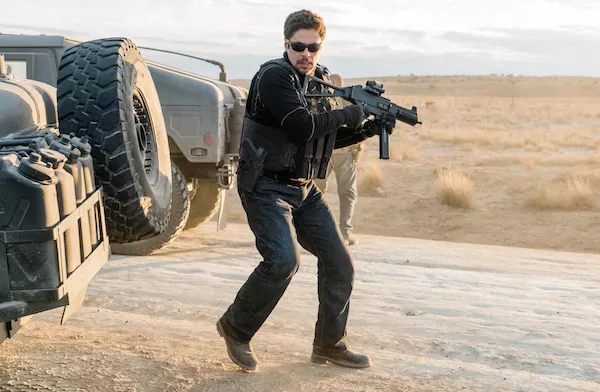
- Benicio Del Toro in Sicario: Day of the Soldado (Photo: Columbia)
SICARIO: DAY OF THE SOLDADO (2018). Directed by Denis Villeneuve and written by Taylor Sheridan, the 2015 feature Sicario focused on conscientious FBI agent Kate Macer (Emily Blunt) as she became involved in a clandestine effort to bring down a powerful Mexican drug cartel. Macer’s story ended with Sicario, and rather than force the round character into the square peg that is Sicario: Day of the Soldado, Sheridan, backed by new director Stefano Sollima, has wisely opted to focus on the other central characters from the first film. That would be Alejandro Gillick (Benicio Del Toro) and Matt Graver (Josh Brolin), hardcore operatives who tend to shoot first and ask questions later. Without Macer/Blunt’s humanizing presence, this ran the risk of being nothing but two hours of unrelenting machismo and unprecedented bloodletting; while that is thankfully not the case, the film is nevertheless far inferior to its excellent predecessor. Alejandro and Matt are here given carte blanche to conduct the war on drugs in any manner they see fit. At least that’s the initial promise from the U.S. government – later, when a retraction is ordered because (as one character accurately notes) the incompetent Trump is a “coward” who’s “afraid of being impeached,” the good guys are left scrambling. While nitwit white supremacists will doubtless rent this film believing it’s a call to build the wall, the truth is that it’s actually sympathetic toward ordinary Mexicans, instead reserving all its outrage for those drug dealers who have no qualms about treating their fellow countrymen (and women) as disposable cattle. On this level, the movie largely works as a robust action-thriller, but its effectiveness is ultimately undermined by a sloppy third act riddled with absurd coincidences and unresolved plotlines.
Blu-ray extras consist of a trio of behind-the-scenes pieces.
Movie: **1/2
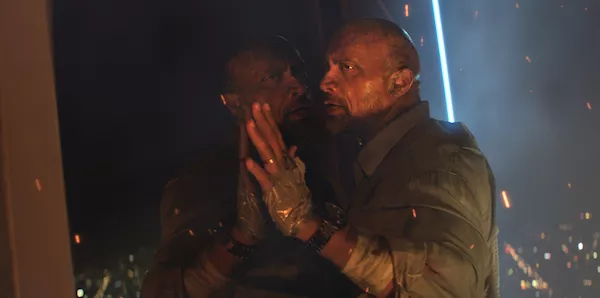
- Dwayne Johnson in Skyscraper (Photo: Universal)
SKYSCRAPER (2018). How charismatic is Dwayne Johnson? I wouldn’t go so far as to say I would watch him read a phone book, but an Archie comic or the back of a cereal box wouldn’t be out of the question. As for watching him in something as stridently generic as Skyscraper, that’s a tougher call to make. Here, the actor must muster all his appeal to float this action yarn in which his character, Will Sawyer, is a former FBI agent who has just landed an enviable position as the security overseer at The Pearl, a Hong Kong skyscraper and the world’s tallest such edifice. Sawyer has barely had time to stop and smell the success when he's framed for a devastating fire ripping through the building, one meant to cover up a crime targeting The Pearl’s creator (Chin Han). Worse, Sawyer’s family is trapped inside the towering inferno, meaning he must resort to impossible measures to rescue them while simultaneously evading the criminals also trapped in the building. Basically, Skyscraper is a variation on the Die Hard template, but there’s not much here that will lead to many declarations of yippee-ki-yay from viewers. Oversized action flicks will always go for the gusto with bigger and better and crazier stunts, but the level of suspension of disbelief necessary to swallow the stunts on view here probably hasn’t been invented yet. Those with acrophobia might respond to some of the sky-high action sequences, while the climactic skirmish will amuse fans of the classic “hall of mirrors” sequence from Orson Welles’ The Lady from Shanghai. Otherwise, this is entertainment on autopilot, with plot pirouettes that barely matter, double crosses that can be spotted from across the Atlantic, and snarling villains cut from the most generic cloth possible.
Blu-ray extras include audio commentary by director Rawson Marshall Thurber; making-of featurettes; and deleted scenes.
Movie: **
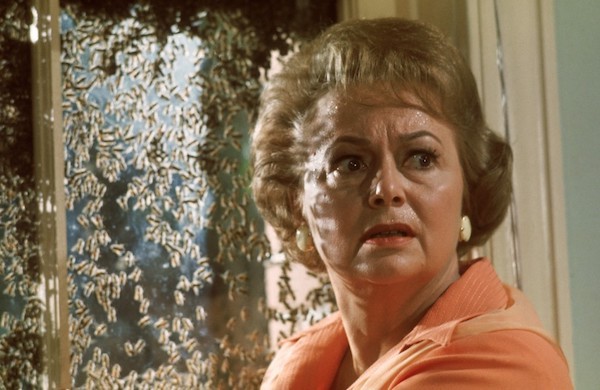
- Olivia de Havilland in The Swarm (Photo: Warner)
THE SWARM (1978). While critics like to pretend that they emerged from the womb with an instant appreciation of Citizen Kane, a familiarity with the Akira Kurosawa oeuvre, and acute insight into the religious imagery of Ingmar Bergman’s The Seventh Seal, the truth is that we all championed films in our youth that now trigger a feeling of abject embarrassment to go along with all that warm nostalgia. Among my shameful selections — rancid movies that I adored and saw an infinite number of times as a lad — are the Star Wars rip-off Starcrash, the Clint Eastwood hit Every Which Way But Loose, and this infamous Irwin Allen production that helped kill off the “disaster movie” genre that dominated the 1970s. As a boy, I was a sucker for many of the all-star idiocies of the era, including this one (I drew the line, however, at When Time Ran Out and The Concorde: Airport ’79, both truly awful). As an adult, I recognize that The Swarm is, well, not good, but I can now enjoy it as a so-bad-it’s-brilliant endeavor. Certainly, there’s a lot of unintentional humor to be mined in this tale of African killer bees laying waste to various Texas towns, from the overripe performances to the dopey dialogue. On the former point, the worst emoting comes courtesy of Olivia de Havilland and, surprisingly, Michael Caine, who for some reason SHOUTS much of his dialogue; on the latter, I’ve always been partial to the line uttered by Richard Widmark’s outmatched army general: “Houston on fire. Will history blame me, or the bees?” The Swarm was a notorious box office bomb, but it did manage to pick up a solitary Academy Award nomination for Best Picture. (Kidding! It did score one, however, for Best Costume Design.).
The Blu-ray from the Warner Archive Collection contains the 156-minute international version rather than the original 116-minute US cut. Extras consist of a vintage behind-the-scenes featurette and the theatrical trailer.
Movie: *1/2 (but **** for aficionados of turkey cinema)
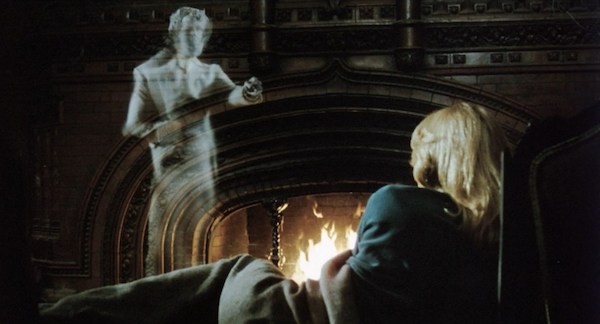
- The Evil (Photo: Shout! Factory)
Short And Sweet:
THE EVIL (1978). Richard Crenna and Joanna Pettet are cast as a married couple (atheist psychologist and Christian doctor, respectively) who, with the help of some associates and former patients, attempt to turn a ramshackle mansion into a rehab clinic. But the benevolent spirit of the original owner tries to warn them — to little avail — that a demonic force resides within the house, which soon becomes apparent as the members of the gathered party start getting picked off one by one. Risible in a few spots but competently presented most of the time, The Evil is a respectable horror yarn aided by a good cast.
Blu-ray extras consist of audio commentary by director Gus Trikonis, scripter Donald G. Thompson, and director of photography Mario Di Leo; the theatrical trailer; and a TV spot.
Movie: **1/2
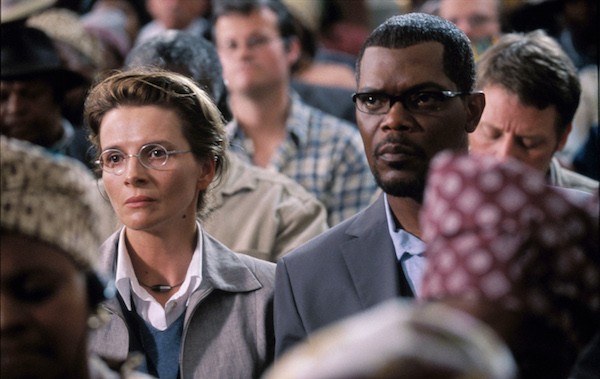
- Juliette Binoche and Samuel L. Jackson in In My Country (Photo: Twilight Time)
IN MY COUNTRY (2004). Like The Official Story (see review above), here’s another drama that explores the mindset of a country immediately after its control by murderous evildoers has ended. In this case, it’s South Africa right after the end of apartheid, as the nation tries to heal through the South African Truth and Reconciliation Commission hearings held in the mid-1990s. Samuel L. Jackson plays Langston Whitfield, a Washington Post journalist sent to cover the hearings, while Juliette Binoche co-stars as Anna Malan, a liberal Afrikaner tasked with reporting on the proceedings for radio. Better than its mangy reputation, In My Country is at its strongest when it centers on the courtroom scenes and less compelling (but still watchable) when it strays.
Blu-ray extras include audio commentary by director John Boorman; interviews with Boorman, Binoche and screenwriter Ann Peacock; deleted scenes; and the theatrical trailer.
Movie: **1/2


